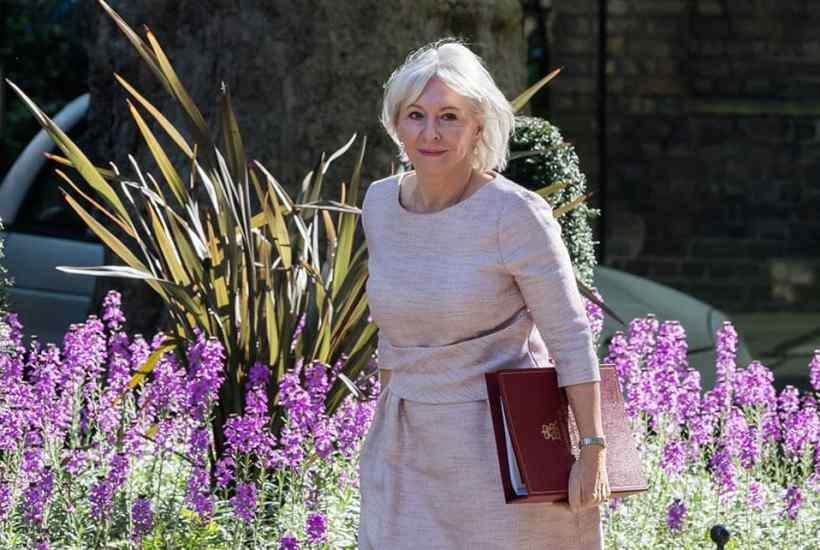When Nadine Dorries was named Culture Secretary last year, it proved to be the most controversial appointment of Boris Johnson’s reshuffle. Her critics weren’t afraid to point to what they saw as her flaws. She was a Scouser and former nurse put in charge of the cultural crown jewels. The only explanation they could come up with: she was intended to embody a two-finger flick, on behalf of the PM, to the BBC, Channel 4 and the arts world in general.
The furore, she says, didn’t come as a surprise. ‘There are some men who do have a problem with a woman from my background achieving,’ she says. It also pointed to something else: a fear that she might do what her predecessors had not done. ‘I think they obviously knew that I was going to deliver. The notion of Channel 4 being sold, the licence fee, the BBC, all of those things that have been in the ether for years, I think there was a sudden realisation that something might happen now. I think that was part of the attack,’ she tells me when we meet in The Spectator’s offices for a recording of my Women with Balls podcast. ‘Over a long period of time, not a huge amount had been delivered from my department. I am now in a position where I have got five bills to deliver. This department hasn’t had five bills in 20 years.’
Top of that list is the Online Safety Bill aimed at regulating the internet. Dorries proudly points out it passed the Commons on second reading ‘without even a vote’. But what of the criticisms? I mention Steve Baker, a serial rebel, who is concerned about implications for freedom of speech. ‘We’ve got 359 MPs, you’ve talked about one; it is actually two that have got concerns, so out of 359, I don’t know what percentage that is but it’s pretty low,’ she replies briskly. ‘Here in Westminster some people, a very small number of people, are talking about freedom of speech. Actually across the country, the bill has been really welcomed.’
Part of the controversy is that, while the bill bans harmful content, ‘harmful’ is very hazily defined. In the House of Commons, Dorries suggested that a Twitter ‘pile-on’ would be harmful. What did she mean? ‘A Twitter pile-on on a footballer because he missed a penalty – racist hatred – is applicable,’ she says. ‘A Twitter pile-on on me because someone doesn’t like the Online Safety Bill doesn’t count, because that’s public debate.’
Expect more debate to follow as Dorries sets out her vision for funding the BBC. Its licence fee model, she says, is ‘completely outdated’. ‘We are going to very soon announce that we are going to be looking very seriously about how we fund the BBC,’ she says. Decisions, she says, will be taken ‘well ahead of the [BBC] Charter renewal in 2027’.
‘We are ready to implement a new way of funding the BBC,’ she says. ‘We’re going to be looking at how Ofcom hold the BBC to account and then very shortly after that we will be announcing other measures that we are going to put into place to start looking at how the BBC will be funded in the future so that we are well in time to have that in place for the Charter renewal.’ After her decision to privatise Channel 4, she is keen to keep up momentum.
Why is she in such a rush? ‘A lot of people today tend to be quite risk-averse. They don’t like people not liking them and so they’d rather not put their heads above the parapet,’ she says, citing social media as a factor. ‘I probably am old-school. I’m 65 in a few weeks, I’ve been here a long time so I’m less worried about my long-term career. I’m less concerned about getting a bad rep or being attacked for supporting the Prime Minister. Some people who have got a career in front of them don’t want to rock the boat just now. I think that’s got something to do with it.’
Got something to add? Join the discussion and comment below.
Get 10 issues for just $10
Subscribe to The Spectator Australia today for the next 10 magazine issues, plus full online access, for just $10.
The full interview is available as a Women with Balls podcast, out now at spectator.co.uk/podcasts
You might disagree with half of it, but you’ll enjoy reading all of it. Try your first month for free, then just $2 a week for the remainder of your first year.















Comments
Don't miss out
Join the conversation with other Spectator Australia readers. Subscribe to leave a comment.
SUBSCRIBEAlready a subscriber? Log in